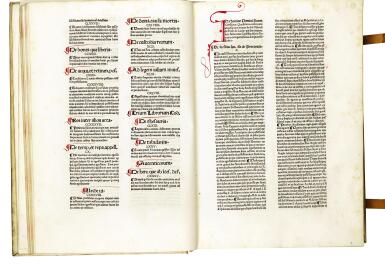Important Manuscripts, Continental Books and Music
Important Manuscripts, Continental Books and Music

From the Collection of the Library of the Jewish Theological Seminary
Oldradus de Ponte, Consilia et quaestiones, Rome, 1478, modern vellum
Auction Closed
June 11, 02:50 PM GMT
Estimate
10,000 - 15,000 GBP
Lot Details
Description
OLDRADUS DE PONTE DE LAUDE
Consilia et quaestiones [edited by Alphonsus de Soto]; Johannes Franciscus de Pavinis. Responsum de iure super controversia de puero Tridentino a Judaeis interfecto. Rome: apud Sanctum Marcum (Vitus Puecher), 1478
Royal folio (389 x 270mm.), 246 leaves (for detailed collation please see the printed catalogue), double column, 59-60 lines, red initials and paragraph marks, nineteenth-century vellum with vellum straps, spine lettered in ink, repairs on corners of first few leaves, occasional marginal soiling, wormed at end, last leaf soiled and repaired
Oldradus de Ponte had been an advocate at the papal court of Avignon in the early fourteenth century, known to Petrarch who referred to him as the eminent jurist of his time. His Consilia were first printed in Rome by Adam Rot in 1472. That edition contained 264 consilia, as reprinted here in quires 4-23. The remaining quires contain additional consilia 265-333, many of which the editor refers to as being found in a particular old codex. The editor dedicated the work to Giovanni Francesco Pavini and remarked on his help in preparing it, including sending the printer, Vitus Puecher, to the eminent jurists of Rome, and even to the cardinals, in a search for relevant manuscripts.
The two supplementary quires, printed here for the first time, contain a lengthy legal responsum by Pavinis regarding the supposed ritual murder of the boy Simon of Trent. In the summer of 1475 Sixtus IV learned of the rapid trial and executions of the Jews of Trent, which seemed to impinge on his papal prerogatives. He sent a representative to investigate the matter, Battista dei Giudici, bishop of Ventimiglia; although a Dominican and no friend to the Jews, he was soon convinced that the trials had been corrupt, and that the Jews had been entirely innocent. This created a problem for Sixtus; the Prince-Bishop of Trent who had supported the trials, Johann Hinderbach, had powerful allies in both Church and Empire, and he also accused dei Giudici of collusion with the Jews. Sixtus appointed a commission of cardinals to investigate further, with Pavini as their legal consultant. Pavini was co-opted by Hinderbach, resulting in a delayed and mixed judgement, embodied in Sixtus’ papal bull of 20 June 1478. Sixtus declared that no cult of Simon as martyr was to be allowed, but that the original judicial process had been right and fair. Pavini convinced his friends in Trent to contribute 30 ducats for the costs of printing 300 copies of his Responsum, to be attached to his enlarged edition of the Consilia of Oldradus; and he seems to have been given an additional reward by Hinderbach. Besides defending the legitimacy of the trial against the Jews of Trent, Pavini argued that the forced conversion of the women and children of Trent was proper, despite Thomas Aquinas’s statements against forced conversions.
LITERATURE:
ISTC io00062370; R. Po-chia Hsia, Trent 1475: stories of a ritual murder trial (Yale University Press, 1992)
PROVENANCE:
Augustinian canons of Gars, Upper Bavaria, inscription at start of table; Mortimer L. Schiff (1877-1921), morocco booklabel (not found in his 1938 sale catalogues, presumably donated to); Jewish Theological Seminary, bookplate and ink stamp
